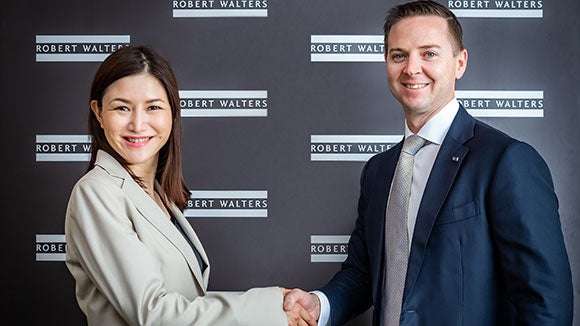「グローバルな視点」が私の仕事観を変えた
ニューヨーク州弁護士・山口真由さん×代表取締役ジェレミー・サンプソン

ニューヨーク州弁護士、そしてテレビのコメンテーターなどとして活躍する山口真由さんは、アメリカでの留学経験を機に、自らのキャリア観、働き方への考え方が大きく変わったといいます。財務省を飛び出し、グローバルな考え方に触れたことで、自らキャリアを考えることの重要性を実感した山口さん。その中で見出した、日本型の伝統的仕事観とグローバルな仕事観の違いとは。ロバート・ウォルターズ・ジャパン代表取締役のジェレミー・サンプソンとともに、大きな変化のさなかにある日本人の働き方について語っていただきました。
幼い頃からの憧れだった財務省を2年で退官
対談冒頭、サンプソン社長が質問する。「なぜ財務省というキャリアを選ばれたのですか。他のキャリアの選択肢は当時検討されていましたか」サンプソン社長の質問に対し、山口さんはこう振り返った。
「小学5年生のとき(外交官だった)皇后・雅子さまのご成婚もあり、ドラマでは(通産省をモデルにした)「官僚たちの夏」をやっていました。そういうイメージで、国の中枢で働きたいと考えるようになりました。私はその時からずっと霞が関しか考えていませんでした」
幼い頃からの念願が叶い、財務省で働くこととなった山口さんだが、2年で財務省を離れることとなる。「その時のインスピレーションはどういったものでしたか」とサンプソン社長が尋ねると、山口さんは、当時の違和感を語った。
「財務省という組織は好きでしたが、典型的な日本の組織で、『家族的』な考え方の職場でした。ボスの言うことは絶対で、女性の役割も固定化していました。そうしたところは心地よい反面、そこにはまることができなければ、少し居心地の悪さがあって『私は何がしたいんだろう』と初めて考えるようになりました」

「家族的」な組織に感じた戸惑い
「家族的」な職場の雰囲気とは、どんなものだったのだろうか。山口さんは「ケアとコントロール」という言葉で説明した。
「ケアの側面では、新人をとても長期的に大事に育てるという視点で、何も言わなくても誰かが手を差し伸べてくれましたが、組織としてのコントロールも強く、進むべき道は組織に決められているし、『気を遣っているのだから、こうしなさい』という雰囲気があります。そのうちに、人生のコントロールを失っていくような気もしました」
「自分の価値観をカイシャの価値観が少しずつ変えていくわけですが、ああしろこうしろではなく『家族ですから』と抱き込むような関係性。居心地のいい反面、怖くもなります。また、日本的な組織には、排他性があると感じていて、例えば副業をしたり、別のコミュニティーに属したりというのが(許されない)。『家族』の中にいる以上は全部の時間を家族のために使わなければならないような、100%、200%のコミットメントがほしい、という感覚があります。そうなると、知らないうちに『私の人生の全てはカイシャです』ってことになっていきます」
サンプソン社長も、日本の伝統的な組織の働き方とグローバル企業での働き方の違いを指摘する。
「日本人は勤勉でロイヤリティが高く、まわりを大事にする傾向は強いと思います。ただし、企業はロイヤリティを求めてはきますが、自分に対するロイヤリティ、家族に対するロイヤリティなどもあり、ロイヤリティはカイシャに対するものばかりではありません。『自分よりもカイシャが大事』ではいけないと思います」日本の多くの伝統的な企業像にも重なる、『家族的』な組織のあり方。そこに少しの居心地の悪さを覚え、自分は何がしたいのかを自らに問い始めた山口さんは、財務省を退官し、大学時代に取得していた司法資格を生かし、弁護士としての道を歩み始める。
アメリカ留学で直面した壁
そんな山口さんが、自らのキャリアを考える上で大きな転機となったのは、アメリカの名門、ハーバードのロースクールへの留学だった。山口さんが直面したのは、英語の壁と言うよりも、コミュニケーションスタイルの違いだった。
当初、英語に自信がないと思うあまり全く発言しなかったと山口さんは振り返る。これではダメだと思い、先生にレポートを書いて伝えたという。
「そしたら、先生は、あなたは何も発言しないから何も考えていないのかと思っていたら、ちゃんと考えていたのねと言ってくれて、それぞれに伝え方はある、自分なりのコミュニケーションをすればいいんだと思いました。日本人は、話していると文法を直したがりますが、3単現のs忘れたって真っ赤になるんじゃなくて、もういいや喋っちゃえとなりました」
山口さんが気づいたのは、自分がこういう能力を持っているよということをどんな形でもいいから伝えるということの大切さだったという。
「コミュニケーションは届けるまでが責任ですから、例えば自分にはこういうふうに思っていて、こういう経験、経歴があってというのを黙っててもみんな分かってくれるでしょ、ではなくて、ちゃんと言わないとと思うようになりました」
サンプソン社長も、グローバル企業に転職を希望する日本人で、コミュニケーションで苦しんでいる人もいると言うが、「コミュニケーションスキルについては、英語力によらない意思表明の仕方もあるはずです」と強調する。
「自分は何がしたいのか問い続ける」 ハーバードでの気付き
そんな山口さんが、ハーバードでもう一つぶつかった壁は「自分は何者で、何をしたいのか」という問いだった。
「日本にいる時は、自分が本当に何をしたいのかということをそこまで考えずに、ある意味、レールに乗っているところもありました」と語るが、ハーバードで出会った人々は大きく意識が違った。
「例えば卒業式にスピルバーグ監督が来て、『君たちは何者か?』って聞き続けるわけですよね。人生において何を成し遂げたいのかと聞かれて、会社じゃなく個人として、どういう人生を送りたいのか、どういう企業でどういう仕事でどういうことにつなげていくのか、自分できちんと考えなくてはならないと思うようになりました」
「海外で学んだことは、『自分は何がしたいのか』自分に問い続けなければならないこと。それをスピルバーグ監督のように18歳のときにカメラを貰って気づけば幸せですけれど、多くの人はそうではないので、転職などの機会にコンサルタントの人たちと話しながら、自分自身に気づいていくと思うんですね。そういう過程を経て自分自身のアイデンティティ、自分は何を達成して、どうやって社会に貢献していきたいのかというのを不断に問い続けることが大事なんじゃないかと思います」
山口さんの経験を受けて、サンプソン社長も同意する。「組織としての目標だけではなく、個人的に到達したいキャリアパスを追求するということは、一人ひとりがイニシアチブを持って動くことを意味します。自分が成し遂げたいことに対して、イニシアチブを持って動くことは、自分の可能性に挑戦するという意味で、ひとりひとりの人生において、特に重要なことですし、グローバル企業もそのような人材を求めています」

転職を考えるのは「自分に出会うこと」
山口さんは「会社にいる限り、引退までずっと大丈夫という社会ではもう無くなってきていますよね。歳を重ねた時に、自分はどういった専門性を身につけていくのかを考えてやってきた人と、全く考えない人とでは全然違ってくると思います」と指摘する。
サンプソン社長も近年日本の企業のあり方やそこでの働き方に大きな変化を感じるという。だからこそ「どのような組織に属しているのであれ、大事なことがあります」と力説する。
「大事なことは、自分のやりたいことに対して情熱を持ち、成し遂げたいことを明確にして、そこに向かうことです」。自分のやりたいことに自覚的であり、受動的に何かを受け取るのではなく、一歩踏み出して挑戦する生き方ということだ。
日本社会が大きく変化する中で、グローバルな視点に立ち、自らイニシアチブを持って動くことができる人材の活躍の舞台は大きく広がっている。
サンプソン社長は「まだ多くの日本人はチャンスがあるにもかかわらずグローバルに目を向けられていません。自分がもっと活躍できる機会に気づいてほしいと思っています」と語り、ロバート・ウォルターズ・ジャパンとして、活躍の可能性を持つ人たちが「本当にやりたいこと」を見つけていくサポートをするのが自分たちの役割だと言う。
山口さんも、転職しようと考える過程は、自分が何なのか、色んなことが自分の中に降りていく過程だと言う。「『自分は本当はこういうことがしたかったんだな』とか、英語のレジュメでも『こういうふうにつないでいくと説得的だな、次につながっていくな』と自分のストーリーを考えるきっかけだと思うので、転職とは、自分に出会うことなんだと思うことが大事だと思います」
サンプソン社長は最後にこう呼びかけて、自分の可能性を諦めない人々にエールを送った。
「自分の可能性を信じて、大志を抱き、イニシアチブを取って動く。そして挑戦する。挑戦すれば必ず、未来の成長に繋がります」
Related content
View allグローバル人材の転職を支援する人材紹介会社ロバート・ウォルターズ・ジャパン株式会社は、2024年6月1日付で同性パートナーに配偶者と同等の待遇を提供する福利厚生を開始しました。 日本では現時点で同性婚が法的に認められていない為、一方のパートナーが社会保険の扶養を受けたい場合、権利が与えられていないのが現状です。つまり健康保険や厚生年金の扶養に入れる条件を満たしていたとしても、同性婚という理由から、扶養申請をする事ができず、各自治体の区役所にて国民健康保険、国民年金を自身で負担する必要があります。 今回、当社は同性のパートナーがいる社員で、そのパートナーが健康保険組合の提示する扶養条件を満たす場
もっと読むグローバル人材の転職を支援する人材紹介会社ロバート・ウォルターズ・ジャパン株式会社は5月30日、4月に開催された「東京レインボープライド2024」の当社のブースに来場いただいた会社員の方を対象とした職場における多様性と包括性に関する最新の調査結果を発表しました。 多様性と包括性の重要性 多様性と包括性、特にLGBTQ+を積極的に推進する企業で働くことの重要度を回答者が1~10の10段階で評価した結果、43%が多様性と包括性に富んだ企業で働くことが非常に重要であるという「10点」の評価をしました。反対に、まったく重要でないという評価したのはわずか5%で、多様性と包括性の重要性を理解し推進する企業
もっと読むグローバル人材の転職を支援する人材紹介会社ロバート・ウォルターズ・ジャパン株式会社は、アジア最大級のLGBTQ+イベント「東京レインボープライド2024」(2024年4月19日(金)~21日(日)開催)に初協賛・出展いたします。 「東京レインボープライド2024」は、性的指向、性自認にかかわらず、すべての人が、より自分らしく前向きに生きていくことができる社会を目指し、LGBTQ+当事者、支援者(アライ)とともに性の多様性を発信するアジア最大級のイベントです。 【東京レインボープライド*への協賛について】 今回、当社は誰もが自分らしく生き、尊重される文化の醸成を目指す企業として同イベントへの初協
もっと読む
